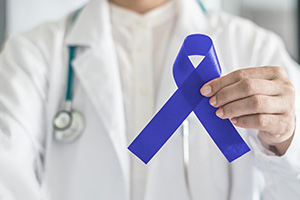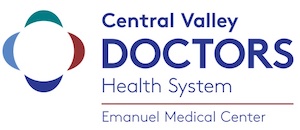Emanuel Cancer Center Recognizing National Colorectal Cancer Awareness Month
Feb 19, 2021March is National Colorectal Cancer Awareness Month and Emanuel Cancer Center is raising awareness of this potentially life-threatening disease. The good news is, colorectal cancer is preventable, treatable and beatable.
The American Cancer Society estimates the following statistics for colorectal cancer cases in the United States for 2021:
- 104,270 new cases of colon cancer
- 45,230 new cases of rectal cancer

“Colorectal cancer is not a common topic of conversation, but it’s important to talk about and it’s important to get screened,” said Sandra Zaky, MD, MS, DABR, Stanford Radiation Oncologist at the Stanford Emanuel Radiation Oncology Center at Emanuel Cancer Center. “Excluding skin cancers, colorectal cancer is the third most common cancer diagnosed in both men and women in the United States, which is why awareness and prevention are so important.”
Colorectal cancer starts in the colon or the rectum. These cancers can also be named colon cancer or rectal cancer, depending on where they start. Most colorectal cancers start as a growth – called a polyp – on the inner lining of the colon or rectum.
“Many lifestyle-related factors have been linked to colorectal cancer,” said Mohamed Eldaly, MD, Medical Oncologist at Emanuel Cancer Center. “The links between diet, weight and exercise and colorectal cancer risk are some of the strongest for any type of cancer. Quitting smoking, maintaining a high level of physical activity and consuming alcohol in moderation are all known to reduce the risk of colorectal cancer.”
Experts say limiting consumption of processed meats and red meat, particularly those that are prepared at high temperatures (such as through grilling or charring) is also prudent.
In addition to lifestyle factors, regular colorectal cancer screening is one of the best ways for preventing colorectal cancer. With regular screening, most polyps can be found and removed before they have the chance to turn into cancer.
“Because of COVID-19, many patients have been delaying or postponing their screenings and medical needs due to fear of coming to the hospital or clinic. There is no need to delay your care. In fact, it can be dangerous to do so,” said Rishabh Chaudhari, MD, Stanford Radiation Oncologist at the Stanford Emanuel Radiation Oncology Center at Emanuel Cancer Center. “When it comes to screenings, especially for colorectal cancer, it’s important to keep up with regular screenings to help prevent any potential issues from getting worse down the road. We are taking every precaution in keeping patients safe when they come to us for care.”
“The American Cancer Society recommends that men and women who are 45 years of age or older should start getting screened for colorectal cancer. However, we are seeing an increase in colorectal cancer cases that are impacting patients in their 20’s and 30’s,” Dr. Eldaly said. “The reasoning for this increase may be related to dietary changes. For example, high fat diets from an early age alter bacteria in the intestines that may predispose to cancer. The same occurs with low fiber diets – meaning lacking fruit and grains – which may alter the healthy bacteria in the intestines.”
There are currently no formal screening guidelines for colorectal cancer patients in their 20’s and 30’s, except in the instance of a strong family history, history of intestinal polyposis or a known genetic mutation. However, a genetic DNA test may be an alternative screening.
“Listen to your body. Regular colorectal cancer screening is one of the most powerful weapons for preventing it,” said Dr. Zaky. “Colorectal cancer might not cause symptoms right away, but if it does, it may cause one or more.”
Symptoms may include:
- Change in bowel habits that lasts more than a few days
- Feeling that you need to have a bowel movement that’s not relieved by having one
- Rectal bleeding or blood in the stool
- Cramping or abdominal pain
- Weakness and fatigue
- Unintended weight loss
“It’s important to know many of these symptoms can be caused by conditions other than colorectal cancer, such as infection or irritable bowel syndrome,” Dr. Eldaly explained. “Still, if you have any of these problems, it’s important to see your doctor right away. Early screening and detection of colorectal cancer is crucial.”
Colorectal cancer screening tests include:
- Stool Tests
- Flexible Sigmoidoscopy
- Colonoscopy
- CT Colonography (Virtual Colonoscopy)
- Cologuard Tests
“While each test has advantages and disadvantages, there is no single ‘best test’ for any person. Be sure to talk with your doctor about the pros and cons of each test, and how often to be tested,” Dr. Chaudhari said.
To take a free online health risk assessment for colorectal cancer, please visit emanuelmedicalcenter.org/health-assessments or call (855) 604-4263 to find a physician and schedule a screening.

